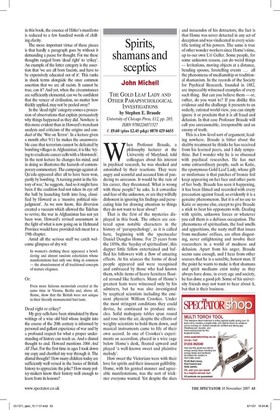Spirits, shamans and sceptics
John Michell THE GOLD LEAF LADY AND OTHER PARAPSYCHOLOGICAL INVESTIGATIONS by Stephen E. Braude University of Chicago Press, £12, pp. 205, ISBN 9780226071527 © 0.60 (plus £2.45 p&p) 0870 429 6655 When Professor Braude, a philosophy lecturer at the University of Maryland, told colleagues about his interest in psychical research, he was shocked and astonished by their reactions. They were angry and scornful and accused him of pandering to unreason. It would be the ruin of his career, they threatened. What is wrong with these people? he asks. Is it cowardice and fear of the unknown, or are they wilfully dishonest in ignoring his findings and persecuting him for drawing attention to things they do not want to hear about?
That is the first of the mysteries displayed in this book. The others are centered upon notable characters in the history of 'parapsychology', as it is called here, beginning with the spectacular Daniel Dunglas Home. For 25 years from the 1850s, the 'heyday of spiritualism', this dapper little fellow entertained and baffled his followers with a flow of amazing effects. At his seances the forms of dead people appeared and were recognised and embraced by those who had known them, while items of heavy furniture floated around like feathers. Many of Home's greatest feats were witnessed only by his admirers, but he was also investigated by sceptical scientists including the eminent physicist William Crookes. Under the most stringent conditions they could devise, he continued to produce miracles. Solid mahogany tables spun round and rose into the air, despite the efforts of weighty scientists to hold them down, and musical instruments came to life of their own accord. In one of Crookes's experiments an accordion, placed in a wire cage below Home's desk, floated upward and played 'a well-known sweet and plaintive melody'.
How sweet the Victorians were with their love for spirits and their innocent gullibility. Home, with his genteel manner and agreeable manifestations, was the sort of trickster everyone wanted. Yet despite the slurs and innuendos of his detractors, the fact is that Home was never detected in any act of deception and was vindicated in every scientific testing of his powers. The same is true of other wonder-workers since Home's time, up to our own Uri Geller. Some people, for some unknown reason, can do weird things — levitations, moving objects at a distance, bending spoons, foretelling events ... all the phenomena of mediumship or traditional shamanism. In the records of the Society for Psychical Research, founded in 1882, are impeccably witnessed examples of every such thing. But can you believe them — or, rather, do you want to? If you dislike this evidence and the challenge it presents to an orderly, rational world-view, you can simply ignore it or proclaim that it is all fraud and delusion. In that case Professor Braude will call you unreasonable, irresponsible and an enemy of truth.
This is a low-level sort of argument, leading nowhere. Braude is bitter about the shabby treatment he thinks he has received from his learned peers, and I duly sympathise. But I wonder why he is so obsessed with psychical researches. He has met some extraordinary people, such as Katie, the eponymous Gold Leaf Lady, whose gift or misfortune is that patches of bronze foil keep appearing on her face and other parts of her body. Braude has seen it happening, it has been filmed and recorded with every precaution against fraud, so evidently it is a genuine phenomenon. But it is of no use to Katie or anyone else, except to give Braude a stick to beat his opponents with. Dealing with spirits, unknown forces or whatever you call them is a dubious occupation. The phenomena of spiritualism, the foul smells and apparitions, the nasty stuff that issues from mediums' orifices, are often disgusting, never enlightening and involve their researchers in a world of madness and delusion. Apart from his anger, Braude seems sane enough, and I hear from other sources that he is a sensible, honest man. If the point he wants to make is that shamans and spirit mediums exist today as they always have done, in every age and society, he has done a good job. Some of his university friends may not want to hear about it, but that is their business.





































































 Previous page
Previous page